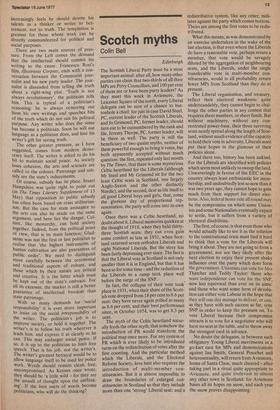Scotch myths
Colin Bell
Edinburgh The Scottish Liberal Party must be a most important animal: after all, how many other parties can claim that two-thirds of all their MPs are Privy Councillors, and 100 per cent of them are or have been party leaders? As they meet this week in Aviemore, the Leicester Square of the north, every Liberal delegate can be sure of a chance to buttonhole a chief: for just in case David Steel, PC, current leader of the Scottish Liberals, and Jo Grimond, PC, former leader, should turn out to be outnumbered by the rank and file, Jeremy Thorpe, PC, former leader, will be there as well. The party is still the beneficiary of two quaint myths, neither of them powerful enough to bring it votes, but both apparently accepted without much question: the first, repeated only last month by The Times, that there is some mysterious Celtic heartland for the Liberals (although Mr Steel and Mr Grimond sit for the two least Celtic seats in Scotland, one largely Anglo-Saxon and the other distinctly Nordic), and the second, dear as life itself to all good Liberal boys and girls, that, come the glorious day of proportional representation, the party will come into its own again.
Once there was a Celtic heartland, no doubt about it. Liberal memories quicken at the tho.ught of 1918, when they held thirtythree Scottish seats: they can even gain some comfort as late as 1931, when Scotland returned seven orthodox Liberals and eight National Liberals. But the story has been fairly depressing ever since. The fact is that the Liberal vote in Scotland is not only smaller than it is in England, but that it has been so for some time — and the reduction of the Liberals to a rump took place well before the surge of the SNP.
In fact, the collapse of their vote took place in 1931, when their share of the Scottish vote dropped from 18 per cent to 8.6 per cent: they have never again polled as many as 8.6 per cent, and their best performance since, in October 1974, was to get 8.3 per cent.
The myth of the Celtic heartland naturally feeds the other myth, that somehow the introduction of PR would transform the political map once more. For any system of PR which is ever likely to be introduced turns on the redistribution of votes after the first counting. And the particular method which the Liberals, and the Electoral Reform Society, love best also requires the introduction of multi-member constituencies. But it is almost impossible to draw the boundaries of enlarged constituencies in Scotland so that they include more than one 'strong' Liberal seat: and a
redistributive system, like any other, militates against the party which comes bottom. Theirs are among the first votes to be redistributed.
What this means, as was demonstrated by an exercise undertaken in the wake of the last election, is that even where the Liberals do have a reasonable vote, perhaps return a member, that vote would be savagely diluted by the aggregation of neighbouring seats, and the Liberals, under the single transferable vote in multi-member constituencies, would in all probability return fewer MPs from Scotland than they do at present.
The Liberal organisation, and treasury, reflect their electoral weakness: quite understandably, they cannot begin to challenge the other parties in any contest that requires sheer numbers, or sheer funds. But without machinery, without any concentrated power-base, their three surviving seats neatly spread along the length of Scotland, without much evidence of the capacity to hold their vote in adversity, Liberals must put their hopes in the glamour of their policies alone.
And there too, history has been unkind. For the Liberals are identified with policies which seem most unlikely to sweep the land. Unwaveringly in favour of the EEC in the country always least enthusiastic for membership, and undoubtedly less so now than it was two years ago, they cannot hope to gain much from their support for direct elections. Also, federal home rule all round may be the compromise on which some Unionists and some Nationalists eventually expect to settle, but it suffers from a variety of electoral disabilities.
The first, of course, is that even those who would actually like to see it as the solution to the constitutional crisis must find it hard to think that a vote for the Liberals will bring it about. They are not going to form a goyernment, nor are they likely after the next election to enjoy their present shaky influence over the party which does form the government. Unionists can vote for Mrs Thatcher and Teddy Taylor: those who want independence can vote for the SNP, now less equivocal than ever on its aims: and those who want some form of devolution can either vote Labour in the hope that they will one day manage to deliver, or can, as they have with such success so far, vote SNP in order to keep the pressure on. To vote Liberal because their compromise attracts is to vote for a negotiator who will have no seat at the table, and to throw away the strongest card in advance.
No doubt the delegates, in between such obligatory Young Liberal merriments as a go-kart race for MPs and demonstrations against Ian Smith, General Pinochet and heterosexuality, will return from Aviemore, home of Santa Claus, much cheered — after taking part in a ritual quite appropriate to Aviemore, and quite irrelevant to almost any other town in Scotland: for Aviemore bases all its hopes on snow, and each year the snow proves disappointing.


































 Previous page
Previous page